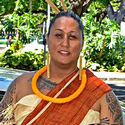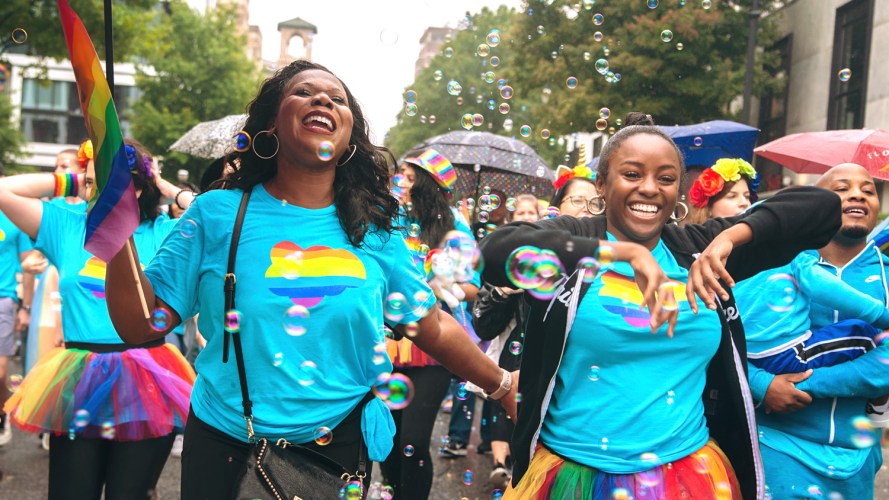During Pride month and throughout the year, we honor the legacy and stories of the many LGBTQ+ trailblazers that came before and paved a new way for generations to come. The modern LGBTQ+ rights movement began with the Stonewall Uprising, led by two revolutionary transgender leaders.
Marsha P. Johnson and Sylvia Rae Rivera were women of color who galvanized many behind the movement. However, as transgender women, they did not feel accepted by the gay community. The early gay and lesbian movement rallied behind the leadership of white cisgender men and women, often leaving trans and LGBTQ+ people of color as outliers.
At Salesforce, we stand firmly against discrimination and are committed to implementing LGBTQ-inclusive policies, practices, and benefits supporting our communities. While there is still more work to be done, let’s learn from the powerful stories of these nine LGBTQ+ women who have inspired — and continue to inspire — greater change, gender equity, and equality for all.

Marsha P. Johnson
Marsha P. Johnson was an activist, self-identified drag queen, performer, and survivor. She reportedly threw the first brick that launched the Stonewall riots and with her activism, sparked a new phase of the LGBTQ+ movement in 1969. Alongside Sylvia Rivera, she established the Street Transvestite Action Revolutionaries (STAR) in 1970, which was an organization committed to providing support, shelter, and food to homeless LGBTQ+ youth and advocating for transgender rights.

Sylvia Rivera
Sylvia Rivera was a Latina-American gay liberation and transgender activist who fearlessly fought for trans rights during the 1970s. During a New York City Council meeting where a gay rights bill was being debated, she tried to climb into a window (in a dress and heels no less) to participate. She later went on to be known as a seminal figure of the LGBTQ+ movement and co-founded STAR alongside Marsha P. Johnson.
Today the Sylvia Rivera Law Project, founded in 2002 in her honor, continues her legacy working to guarantee “all people are free to self-determine their gender identity and expression, regardless of income or race, and without facing harassment, discrimination, or violence.”

Audre Lorde
Audre Lorde was a self-described “Black, lesbian, mother, warrior, poet” whose work was committed to fighting homophobia, racism, and sexism. She was known for “Sister Outsider: Essays and Speeches” and “The Collected Poems of Audre Lorde.” As an award-winning writer, activist and artist she spent her career spotlighting racial and sexual prejudices, calling for liberation across all aspects of identity. In 1981, Lorde helped found the Kitchen Table: Women of Color Press, which focused on amplifying Black writers and feminists.

Megan Rapinoe
Megan Rapinoe is a World Cup and Olympic champion and a fierce advocate for equality and human rights. As the U.S. women’s soccer team captain, she used her spotlight seen around the world to raise awareness around Equal Pay, and was one of the first white athletes to take a knee in solidarity with Colin Kaepernick against police brutality.
“Uncomfortable is what we need to be right now,” Rapinoe shared during her Salesforce Leading Through Change interview. “Insert antiracism education into your daily practice. It’s your everyday actions that can do the work of antiracism and make you part of the solution and not the problem.”

Geena Rocero
Geena Rocero is a Filipina transgender advocate and the founder of Gender Proud, a media production company that tells stories of the worldwide transgender community. As she shared in an interview with Gap Inc, she often finds herself to be the “only” trans woman, and sometimes the only person of color, in a room amongst decision and policymakers. This is how she came to realize the true importance of “opening doors for others” — which is why she started a production company.

Edie Windsor
As an American LGBTQ+ rights activist and trailblazer, Edie Windsor was best known for her part in overturning the Defense of Marriage Act (DOMA), which banned same-sex marriage. Windsor was married in Canada due to marriage laws in the United States. When her wife passed away in 2009, she sued the federal government for over $360,000 in estate taxes when it was blocked by DOMA in 2010, creating one of the biggest landmark marriage-equality Supreme Court cases. When the Supreme Court ruled in her favor, the verdict overturned the Defense of Marriage Act. Windsor’s case was the first time same-sex marriage was recognized in the United States.

Jazzie Collins
Jazzie Collins was a Black transgender woman and advocate for transgender and disability rights. She began her activism in 2002, fighting for the rights of marginalized communities in San Francisco. Collins served as the vice-chair of San Francisco’s LGBT Aging Policy Taskforce and Lesbian Gay Transgender Senior Disabled Housing Task Force. In 2003, she successfully directed efforts to set the minimum wage to $8.50, making San Francisco the first city in the country to establish its own minimum wage. This was also the highest minimum wage in the country at the time.
In June 2013, Collins was honored on the floor of the California State Capitol by the Legislative Lesbian, Gay, Bisexual, and Transgender Caucus for her advocacy work for justice and equality.

Hinaleimoana Wong-Kalu
Also known as Kumu Hina, Hinaleimoana Wong-Kalu is an Indigenous Hawaiian transgender woman and māhū, which in Hawaiian culture is a person who embodies the third gender between male and female. They are a filmmaker and founder of the Kulia Na Mamo Transgender Health Project. Wong-Kalu is also one of the first Indigenous Hawaiians to support marriage equality in Hawaiʻi.

Billie Jean King
Billie Jean King is a global sports icon, tennis world champion, and gender equality activist. King broke barriers by pushing for equal prize money for women, most notably during the Battle of the Sexes, and is one of the first openly gay athletes. She led the formation of the Women’s Tennis Association (WTA) in 1973 and threatened to boycott the 1973 U.S. Open if they didn’t address the pay inequity, leading to the first major tournament in the world to award equal prize money to both women and men.
The Equality Act creates clear, consistent protections to prohibit discrimination on the basis of sexual orientation and gender identity in employment. You can learn more about our support for the Equality Act and LGBTQ+ rights through the Human Rights Campaign. Together, we can reach equality in the workplace and build an industry that truly reflects the diverse communities around us. At Salesforce, we are committed to advancing equality in the workplace and in society. If you’re interested in a career at Salesforce, visit our careers page.




























